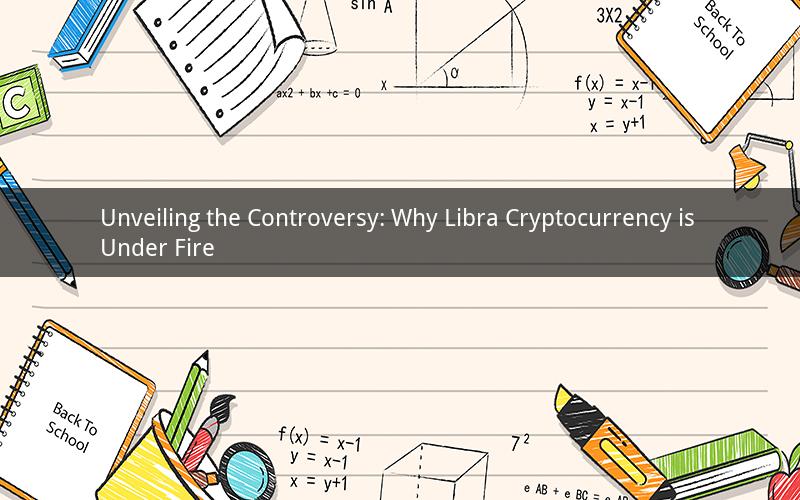
Introduction:
Libra, the much-anticipated cryptocurrency project backed by Facebook, has been met with a storm of criticism and skepticism. While some see it as a revolutionary leap forward in the digital currency space, others argue that it poses significant risks to the financial system and consumer privacy. This article delves into the reasons why Libra cryptocurrency has faced widespread backlash.
1. Concerns about Privacy:
One of the primary concerns surrounding Libra is the potential threat it poses to user privacy. Unlike Bitcoin and other cryptocurrencies that use a decentralized blockchain, Libra relies on a centralized structure, raising questions about how personal data will be stored and used. Critics argue that Facebook, with its history of data breaches and privacy issues, is not a trustworthy entity to handle sensitive financial information.
2. Regulatory Hurdles:
Libra has faced substantial regulatory challenges from governments and financial authorities worldwide. Concerns over financial stability, money laundering, and potential misuse have led regulators to scrutinize the project closely. As a result, Libra's launch date has been postponed repeatedly, with no clear timeline for its official launch.
3. Impact on Financial Stability:
The introduction of a global cryptocurrency like Libra has the potential to disrupt the traditional financial system. Critics argue that Libra's large-scale adoption could lead to excessive volatility in global financial markets, creating new risks for consumers and institutions. Furthermore, the centralized nature of Libra could give a single entity significant power over the global financial system, raising concerns about potential manipulation.
4. Lack of Decentralization:
Libra's centralized structure is a stark contrast to the decentralized nature of Bitcoin and other cryptocurrencies. Critics argue that this lack of decentralization makes Libra vulnerable to manipulation by powerful entities, compromising its core principles of a borderless and transparent financial system.
5. Potential for Money Laundering and Financing of Terrorism:
Given Libra's potential to become a major global currency, concerns have been raised about its vulnerability to money laundering and financing of terrorism. The centralized nature of Libra makes it easier for authorities to track and monitor transactions, but critics argue that the project's ambitious goal of achieving widespread adoption could create new avenues for illicit activities.
6. Lack of Trust in Facebook:
Facebook's history of privacy issues and data breaches has eroded public trust in the company. As a result, many are skeptical of Libra's ability to protect user data and ensure the integrity of the financial system. This skepticism is further compounded by the company's previous attempts to enter the financial services sector, which were met with significant opposition.
7. Potential for Inequality:
Libra's focus on making financial services accessible to the unbanked population raises concerns about the potential for exacerbating inequality. While the intention behind Libra is commendable, critics argue that the project may inadvertently create new disparities by giving powerful entities disproportionate control over the global financial system.
8. Environmental Impact:
The mining process of Bitcoin and other cryptocurrencies requires a significant amount of energy, leading to concerns about their environmental impact. While Libra aims to address these issues by using a different consensus mechanism, critics argue that the environmental impact of the entire Libra ecosystem is still unknown.
Conclusion:
Despite its potential to revolutionize the financial system, Libra cryptocurrency has faced significant challenges and skepticism. From privacy concerns to regulatory hurdles and potential misuse, the project's future remains uncertain. As the debate surrounding Libra continues, it is crucial to carefully evaluate its risks and benefits before considering its adoption.
Questions and Answers:
1. How does Libra's centralized structure differ from other cryptocurrencies like Bitcoin?
Libra's centralized structure relies on a consortium of partner organizations, including Facebook, to manage and operate the network. In contrast, cryptocurrencies like Bitcoin use a decentralized blockchain, where transactions are validated by a network of nodes without a central authority.
2. Can Libra be used for illegal activities such as money laundering?
Yes, like any financial system, Libra can be potentially used for illegal activities. However, critics argue that the centralized nature of Libra could make it easier for authorities to monitor and prevent such activities compared to decentralized cryptocurrencies.
3. Will Libra lead to increased inequality in the global financial system?
While Libra aims to provide financial services to the unbanked population, critics argue that the project may inadvertently create new disparities. The concentration of power among partner organizations and potential manipulation of the system could exacerbate existing inequalities.
4. How does Libra plan to address environmental concerns?
Libra aims to address environmental concerns by using a different consensus mechanism that consumes less energy compared to traditional mining processes. However, the overall environmental impact of the Libra ecosystem remains uncertain and requires further evaluation.
5. Can Libra be a threat to the traditional banking system?
The introduction of Libra has the potential to disrupt the traditional banking system. Its large-scale adoption could lead to excessive volatility in financial markets and give a single entity significant power over the global financial system, raising concerns about potential manipulation.